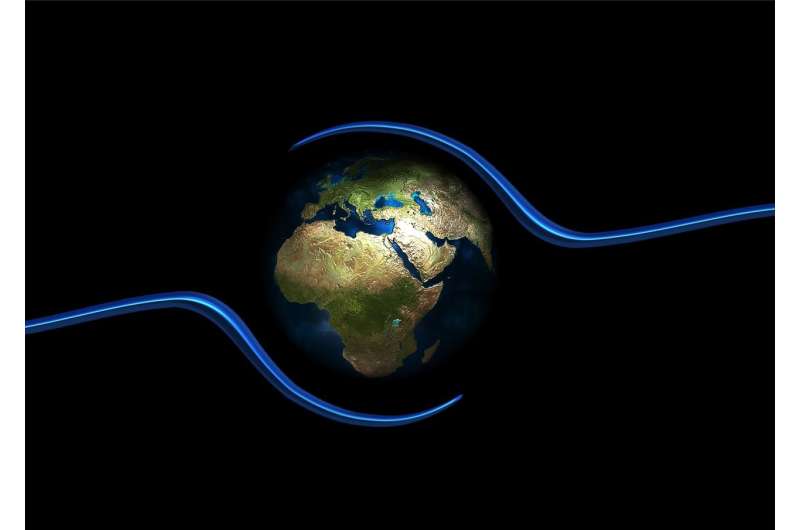This article has been reviewed according to Science X's editorial process and policies. Editors have highlighted the following attributes while ensuring the content's credibility:
fact-checked
peer-reviewed publication
reputable news agency
proofread
Earth's vital signs are now in 'uncharted territory,' climate scientists warn

Massive wildfires in Canada, Greece and Hawaii. All-time record heat waves. Hurricanes with surprising ferocity, like the one that devastated Acapulco last week.
This year has presented stark evidence that Earth is already in "uncharted territory" with climate change, scientists say, to the point that unless major progress is made to reduce greenhouse emissions, parts of the world that are home to one-third to one-half of the global population could face extreme heat, food shortages and water shortages by the end of this century.
That's the conclusion of a new study from researchers at Oregon State University and other institutions around the world, that has been drawing growing attention since its publication last week.
"As scientists, we are increasingly being asked to tell the public the truth about the crises we face in simple and direct terms," the researchers wrote. "The truth is that we are shocked by the ferocity of the extreme weather events in 2023. We are afraid of the uncharted territory that we have now entered."
Of 35 vital signs of planetary health, 20 are at record levels, and most in an environmentally harmful way, the scientists concluded. Although renewable energy is increasing and rainforest depletion is slowing, ocean acidity, glacier thickness, and Greenland's ice mass all fell to record lows over the past two years, while greenhouse gas emissions, sea level rise and ocean temperatures rose to record highs.
What's needed is a much faster phase-out of coal, oil and other fossil fuels, the researchers said in the study, which was published in the journal Bioscience. They also recommended increased protections for the world's forests, more people eating plant-based diets, financial assistance to help the poorest countries deal with extreme weather disasters, and more family planning and women's education to voluntarily slow population growth.
"We are in dire straits, but it's not too late," said William Ripple, lead author of the paper and a professor at the Oregon State University College of Forestry. "The work we do now will make a huge difference."
Global temperatures have risen 2.1° Fahrenheit since 1880, mostly due to the burning of fossil fuels, which traps heat in the atmosphere. The 10 warmest years on Earth since 1850, when consistent modern temperature records began, have all occurred since 2010, according to NOAA, the National Oceanic and Atmospheric Administration, which is the parent agency of the National Weather Service.
This June through August was the warmest such period ever recorded, with record low levels of Antarctic sea ice. Many climate researchers say 2023 could break another record for the hottest year on record.
Some significant environmental shifts are underway. This year in California, 25% of all new car sales are electric—nearly three times the national average. Washington state is second, at 18% and Oregon is third at 17%.
Meanwhile, California is also breaking records every year in renewable energy use. In 2021, 37% of the state's electricity was generated by renewable sources such as solar and wind—more than double the 16% in 2012, according to new numbers released this summer by the California Energy Commission.
When nuclear power and hydroelectricity from large dams are included, 59% of California's electricity now comes from carbon-free sources. The state has a goal of 90% by 2035 and 100% by 2045.
"I agree that the climate crisis is deeply serious and that progress in tackling it is much too slow," said biologist Chris Field, director of Stanford University's Woods Institute for the Environment. "Still, we are seeing impressive progress in some areas."
Field noted that the price for solar and wind energy continues to fall, the performance of electric vehicles is growing, and more large corporations have pledged to reach "net zero emissions."
Last month, Gov. Gavin Newsom signed a law requiring all corporations that operate in California with more than $1 billion in revenue to annually report their greenhouse gas emissions—a first-in the nation law that will include companies from Chevron to McDonald's, and allow the public to see who are the biggest polluters.
"We need to find the political and economic will to dramatically accelerate the pace of change," Field said.
On his first day in office in 2021, President Joe Biden signed an order committing the United States to re-enter the Paris Climate Agreement, a compromise among more than 190 nations to cut fossil fuel emissions that former President Donald Trump had pulled out of.
Biden also pledged for the U.S. to cut greenhouse gas emissions 50% by 2030, and signed the Inflation Reduction Act, a landmark bill that included $369 billion in tax breaks and incentives for solar, wind, electric vehicle production, battery charging stations and other climate investments. Biden appointed Michael Regan, a former vice president of the Environmental Defense Fund, to run the U.S. Environmental Protection Agency.
Trump, who is challenging Biden in next year's election, appointed Andrew Wheeler, a former coal industry lobbyist, to run the EPA when he was president. He attempted to expand offshore oil drilling along the California coast and in Alaska's Arctic National Wildlife Refuge, called climate change "a hoax," and incorrectly stated that wind turbines cause cancer.
Traditionally, scientists have been encouraged by universities to publish findings in scientific journals but not do much outreach to the general public or political leaders, said Ripple, the Oregon State scientist. But that's changing.
"Scientists are starting to do a much better job of warning humanity of these major threats," he said. "It's very much needed for scientists to speak out."
Journal information: BioScience
2023 MediaNews Group, Inc. Distributed by Tribune Content Agency, LLC.




















